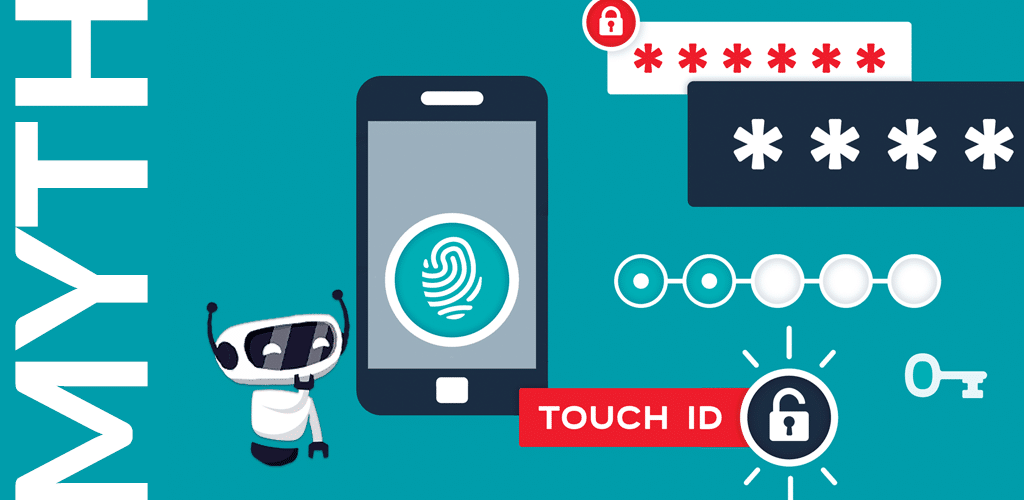February 18, 2020
Privacy Tip of the Week: Bust These Common Password Myths
Posted by Rhiannon

In the digital world, passwords are the key to accessing and protecting our data. They allow us to keep our information private and safe from prying eyes. However, much mystery surrounds one of the most common encryption tools in the world. These are some of the most popular password myths that everyone should know about:
- Passwords are insecure
- Passwords are a thing of the past
- A complex password is better than a long one
- Frequent password changes are safe
- Passwords should be memorable
- Hacks are less frequent with big companies
Myth: Passwords are Insecure
In recent years, many password alternatives have hit the market. They include things like biometrics, phone number login, and more. Due to this influx, as well as frequent news of password hacking, a persistent myth has arisen. It claims that passwords are no longer secure. However, passwords are still one of the safest methods of protecting accounts and data. Users can also create stronger passwords with these guidelines, and by adding two-factor authentication to their accounts.
Myth: Passwords are a Thing of the Past
Many people believe password protection will soon disappear altogether. Belief in this myth is also strongly influenced by the rising number of encryption alternatives. While it’s possible, and even likely, that passwords will eventually be replaced, that advancement is still years away. Current alternatives don’t offer high enough levels of encryption. In addition, before passwords can be replaced, all industries must agree on a new method in order to standardize use.
Myth: A Complex Password is Better Than a Long One
One of the most pervasive password myths is the belief that a complicated password is more secure than a lengthy one. However, password security increases exponentially with length. Experts currently recommend that passwords be between 17 and 24 characters long. In addition, the safety of a password directly correlates to its quality. The majority of internet users are familiar with the standard guidelines. They recommend passwords longer than eight characters, with upper and lower case letters, numbers, and symbols. However, these rules fail to mention that secure passwords should not include dictionary words, birthdays, pet and family names, and other easily guessed sequences.
Password Myths: Frequent Password Changes are Safe
Many businesses and online accounts now force users to periodically change their passwords. This is because of the myth that frequently changed passwords reduce the likelihood of hacking. Unfortunately, forced password changes are more likely to result in users choosing a short, easily remembered option each time. This is more convenient to them, but reduces overall security. Instead of requiring password changes, businesses should emphasize the importance of strong passwords.
Myth: Passwords Should be Memorable
Another common myth is that passwords should be memorable. The logic behind this belief states that it’s more difficult to lose account access if you can remember your password. Unfortunately, memorable passwords are often ones with dictionary words and important dates. Instead of using easily remembered passwords, use a password manager. They store all of your passwords, so you don’t have to sacrifice memorability for security.
Myth: Hacks are Less Frequent with Big Companies
It stands to reason that a large company has more money to funnel into protecting user data. That logic leads to the myth that passwords are safer with a big company, and don’t need to be as strong. Unfortunately, because of the size of a big company, they are often viewed as a more desirable hacking target. Contrary to popular myth, they are also susceptible to hacking. Instead of growing lax with password safety simply because you trust the company storing it, use consistently strong passwords across all platforms.
Passwords are currently the most effective way to protect our data. Busting the harmful myths surrounding them help to make and keep them even stronger.
Posted by Rhiannon
More Blog Posts
February 14, 2023
How the Investigatory Powers Act Impacts Citizen Privacy
In 2016, the United Kingdom passed the Investigatory Powers Act or IP Act, into law. This act empowered the government and related agencies to access and collect citizen data, without consent. Critics immediately slammed the new law. The media dubbed it the “Snoopers’ Charter.” Meanwhile, Edward Snowden described the act as “the most extreme surveillance […] Read moreFebruary 14, 2023
How to Easily Unblock Wikipedia with HotBot VPN
Wikipedia puts a wealth of information at your fingertips. Everything from the biography of Alexander Graham Bell to the basics of quantum computing can be instantly opened by curious browsers. But what happens when you can’t access that information? Whether a business network blocks it or a particular country censors it, don’t let that slow […] Read moreFebruary 14, 2023

